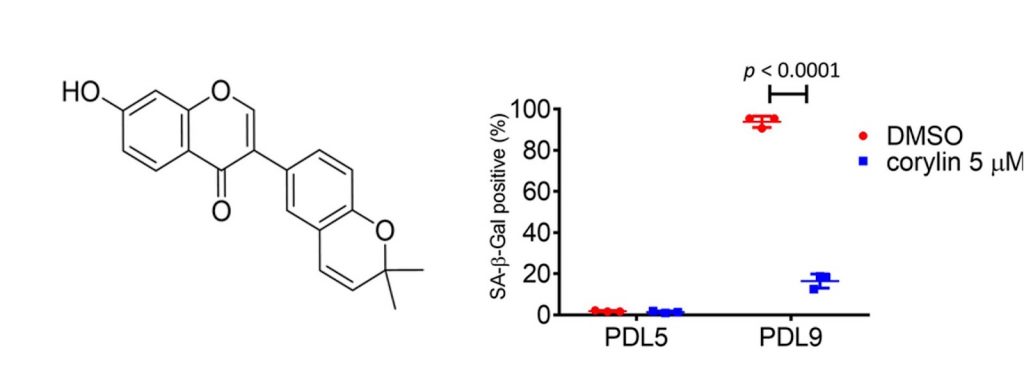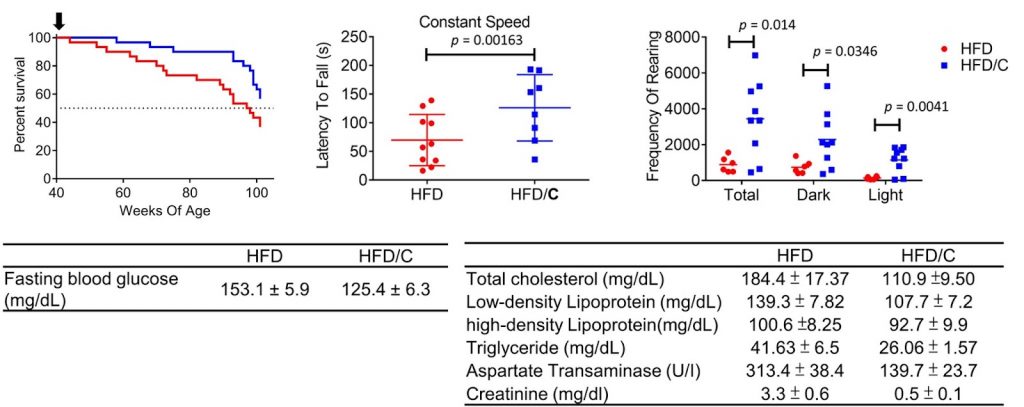Key Points:
- A component called corylin found in a plant used in traditional Chinese medicine increases the replicative lifespan of yeast.
- Mice fed a high-fat diet with corylin had increased survival and did not have as much age-related functional degeneration as their counterparts.
- Corylin also decreased senescence in human cells.
For thousands of years, the herbs and formulations of traditional Chinese medicine have promised to extend one’s lifespan. As modern society’s interest in natural remedies grows, people of today have turned to these ancient remedies to bolster their health and increase their longevity, but do these traditional Chinese medicinal plants actually work?
A study out of Taiwan, published in Nature Communications, indicates that one herb, Psoralea corylifolia, can extend the lifespan of yeast. The Chang Gung University and National Taiwan University researchers find that these life-extending effects can be traced to one compound called corylin, which works via caloric and dietary restriction pathways. Corylin also extends the lifespan of mice fed a high-fat diet (which usually decreases lifespan). In cultured human cells, corylin reduces cellular senescence – an irreversible cell cycle arrest in which cells no longer grow and divide.
“We have proposed an efficient method for screening and validating beneficial compounds to extend lifespan, with strong evidence showing the lifespan extension properties of corylin in yeast and cell models and improving health and survival by facilitating stress resistance in [high-fat diet] mice,” wrote Tong-Hong Wang and colleagues.
Corylin Promotes Longevity
The Taiwanese researchers selected 33 single herbs and six herbal formulas used as traditional Chinese medicines (or TCMs) to treat age-associated diseases, such as osteoporosis and dementia, as well as those thought to increase lifespan. They honed in on the components of a specific herb, Psoralea corylifolia (or P. corylifolia), which enhanced the replicative lifespan of the yeast.
The investigators determined that one specific component of P. corylifolia, corylin, is responsible for the longevity-enhancing effects of the herb due to its impact on Tor1, a protein known to help regulate the lifespan of yeast. A yeast strain lacking Tor1 was unaffected by P. corylifolia treatment, suggesting that Tor1 plays a role in the ability of P. corylifolia to extend the lifespan of the yeast. Ultimately, the scientists determined that corylin affects longevity by decreasing Tor1 signaling.

Corylin Works Via the Tor Pathway and NAD+
The Tor1 pathway – perhaps best known for its role in nutrient sensing and calorie restriction – is a signaling response to nutrients that helps modulate cell growth and metabolism. Decreasing Tor1 signaling can lead to increased NAD+ levels and lifespan extension. Previous research has shown that inhibiting Tor1 increases levels of the Pnc1 protein. Pnc1 converts nicotinamide to nicotinic acid as a precursor in the NAD+ salvage pathway, increasing NAD+ levels, activating stress responses, and increasing lifespan.
In this study, corylin significantly increased Pnc1 in a dose-dependent manner. NAD+ can be indirectly promoted by Pnc1, and several studies have shown that increases in NAD+ help ameliorate age-associated diseases. In fact, NAD+ levels significantly increased following corylin treatment.
Corylin Decreases Senescence in Human Cells and Prolongs Mouse Lifespans
Cells undergo senescence in response to stressful conditions like DNA damage. The investigators looked at whether corylin, as a lifespan extender, can prevent human blood vessel cells (HUVECs: human umbilical vascular endothelial cells) from undergoing senescence. Indeed, corylin treatment resulted in increased population doubling and decreased senescence. Furthermore, the researchers found that the gene activity levels of the senescent cells treated with corylin were similar to that of young cells.
To further evaluate the effect of corylin on lifespan, the investigators fed 40-week old mice (approximately 50 years old in human years) a high-fat diet only or a high-fat diet supplemented with corylin for the rest of their lives. A mere four weeks after the corylin supplementation began, the survival curves of the mice started to diverge. At 102 weeks of age (nearly two years old or 70 years old in human years), 63.3% of the high-fat diet-fed mice had died compared to 43.3% of the high-fat diet plus corylin fed mice, with a maximum difference in the survival rate of 30%. The body weight curves of the mice and their food intake did not differ between the groups, which the authors suggest was due to corylin versus a reduction in the amount of food eaten or caloric intake.
Further assessment of the mice revealed that corylin led to increased activity and better motor skills as the mice aged, compared to those fed a high-fat diet alone. The researchers also showed that mTor1 – the mammalian version of Tor1 – was inhibited in the muscles involved in mobility and strength in the corylin-fed mice, demonstrating that corylin works by inhibiting the mTor1 pathway.
Additionally, the mice fed corylin had lower fasting glucose, total cholesterol, low-density lipoprotein (LDL – the “bad” cholesterol), and triglycerides than the mice fed a high-fat diet alone, indicating that corylin may help lessen the risk factors for metabolic syndrome during aging, benefiting one’s overall health. Additionally, the mice fed corylin had decreased markers associated with age-related organ functionality decline compared to their high-fat diet counterparts.

(Wang et al. 2022 | Nature Communications) Mouse Survival Increased and Metabolic Parameters Decreased by Corylin Supplementation. The mice fed a high-fat diet with corylin (blue) had better (left) survival rates, (middle) motor coordination, and (right) exploratory behavior than those fed a high-fat diet alone (red). The bottom tables show that Mice given corylin had lower fasting glucose, cholesterol, triglycerides, and other metabolic and organ dysfunction parameters than those not supplemented with corylin.
Benefits to Taking Corylin Long-term for Longevity?
Despite the appeal of natural remedies, people may be hesitant to turn to traditional Chinese medicines due to some lack of oversight by the F.D.A., but Chinese medicine has been around for thousands of years. And now, there is scientific evidence to support it, at least when it comes to one specific herb used for longevity.
The researchers note that their findings in the mice “indicate[s] that daily corylin supplement could benefit to overall functionality during [the] aging process and therefore improve[s] quality of life.”
Additionally, several other studies have shown the benefits of corylin, including increased bone strength, reduced obesity, and improved insulin resistance. Therefore, some evidence supports the benefits of corylin supplementation and traditional Chinese medicines for some conditions. However, the results of this study are just the first steps in supporting that corylin could work to promote anti-aging and longevity.